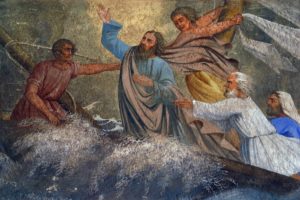
This is the third Google high frequency search question we are considering. While the evangelists and apostles are clear that Jesus is God (several citations will be given at the end of the article), it is best to consider the question through the means that Jesus himself used to introduce his divinity to his disciples: he displayed his sovereignty over the Sea of Galilee. We will attempt to display Jesus’ divinity through the same sequence we see him using in the Gospels. But we begin our discussion with a brief explanation of the Scriptural affirmation of monotheism, the great tenet of Judaism, and how the Trinity of three divine persons, Father, Son, and Holy Spirit, can be reconciled to Mosaic monotheism.
How Can Jesus be God (along with the Father and Holy Spirit) When the Bible Says that God is One?
The “Shema,” the beautiful affirmation of Israel about God, states, “Hear O Israel, The Lord our God, the Lord is one” (Deuteronomy 6:4). The Hebrew word for “one” is “echad.” How can this divine unity be consistent with the three persons of the Christian Trinity, the doctrine that is a necessary precondition to affirm the divinity of Jesus?
Instructively, Moses uses the same word “echad” in his description of mankind, made in God’s image as male and female. Moses writes, “Therefore a man shall leave his father and his mother and hold fast to his wife, and they shall become one flesh” (Genesis 2:24). We understand that there is a mystery unity in the multiplicity of the two persons constituting a marriage. There is a oneness that is authentic but that does not obliterate the two persons, male and female. The fact that man and woman are in the image of God further implies that there is something in their unity within diversity that reflects something originally in God himself.
Consistent with this mystery is the plural form of the Hebrew word for God (Elohim) that is conjoined with singular verbs but retains plural pronouns. It is a complex grammar reflecting the mystery of God. “Let us (plural) make (plural) man in our (plural) image…and God (plural) created (singular) man in his (singular) own image” (Genesis 1:26-27). This may be compared with the baptismal formula Jesus gave his disciples, “Baptizing them in the name (singular) of the Father, and of the Son, and of the Holy Spirit (plural)” (Matthew 28:19).
Moses’ account in Genesis of God’s creative activity likewise implies differentiation in God’s person. He writes, “In the beginning God created the heavens and the earth” (Genesis 1:1). His summation suggests that God is singularly and uniquely the agent behind the creation of the cosmos. But then Moses differentiates God, speaking partitively of the “Spirit of God” that moves over the deep (Genesis 1:2). Then God speaks and we hear the Word of God say, “Let there be light.” (Genesis 1:3). The evangelist John, in a text clearly reflective of Genesis 1, identifies the Word with Jesus, the Word that was God in the beginning but that became flesh in the nativity (John 1:1, 14). Instructively, John’s claim of the divinity of Jesus, a doctrine justly derived from John 1:1, is stated at precisely the time when the Son of God left his Father to seek his bride (John 3:29), with whom he would be made one (John 17:11, 20-21).
How Did Jesus Teach His Disciples that He is God?
Jesus used the Sea of Galilee to prompt his disciples to recognize his divinity. He did this by showing his sovereignty over the sea. His ministry fulfilled the psalmist’s praise of the Lord God: “The sea is his, for it was he who made it, and his hands formed the dry land” (Psalm 95:5).
 Jesus Commands the Wind and the Sea
Jesus Commands the Wind and the Sea
Jesus, exhausted from the labor of the day, slept in the boat while his disciples sailed across the Sea of Galilee. A great storm of wind suddenly arose and the waves threatened to overwhelm the boat. The disciples came to Jesus and awakened him to tell him of their peril. Jesus arose and rebuked the winds and the sea. At his word the storm stopped at once and a great calm was upon the sea. Then the disciples wondered at Jesus, asking, “What manner of man is this, that even the winds and the sea obey him?” (Matthew 8:23-27).
Matthew records the question of the disciples in order to challenge his readers to respond with their own answer to the question. Jesus is certainly a man, as the question assumes. His humanity is seen in his exhaustion; he slept through the storm. But he is more than a man, for at his rebuke the storm ceased and the disciples were saved. The context of the question is the creation narrative. In the beginning, God made the wind of his Spirit to move over the waters of the deep (Genesis 1:2). The question of the disciples prompts the answer that Jesus, who commands the natural forces of the winds and the sea, must be divine as well as human.
Jesus Commands the Fish of the Sea
In the beginning God gave dominion to Adam over the “fish of the sea” (Genesis 1:28). Nowhere is that dominion better expressed than in the ministry of the last Adam, Jesus. Peter, James, and John, experienced Galilean fishermen, had caught nothing through the night. Jesus commanded them to set out and lower their nets once more into the sea. Peter’s experience taught him the effort was futile, yet he obeyed and the catch was so enormous that their boat began to sink from the weight of the catch. Peter recognized that the word of Jesus had commanded the fish into their nets. He confessed his recognition that Jesus was Lord by decrying his own sin. But then Jesus, who had commanded the fish into the nets, now commanded these fishermen into his service. So they left everything to follow Jesus, the man who had dominion over the fish in the sea as well as the fishermen of the sea (Luke 5:1-11).
Jesus Multiplies Bread and Fish for the Multitudes
Once when Jesus disembarked from a boat on the shore of the sea, a great multitude of five thousand gathered around him and he taught them. When they had nothing to eat, Jesus asked what provisions the disciples had at hand. Five loaves and two fish were all that was available. Nonetheless Jesus blessed the bread and began dividing it in order for it to multiply. The five loaves and two fish in the hands of the Creator Lord became sufficient to satisfy the whole crowd. Jesus multiplied the fish and the loaves, the tokens of his complete dominion, for he is the Lord who made the sea and the dry land (Psalm 95:5).
Jesus Commands a Fish in the Sea to Retrieve a Treasure
In the beginning God gave dominion to man over the “fish of the sea” (Genesis 1:28). During his ministry, the last Adam made a fish of the sea to be his servant to retrieve a shekel coin to pay the temple tax for himself and Peter (Matthew 17:24-27).
Jesus Walks on a Pathway Through the Sea
Jesus, after multiplying bread and fish for the five thousand, dismissed the crowds and separated himself to go up onto the mountain of solitude to be alone with God for a season of prayer. He sent his disciples on ahead of him to sail across the Sea of Galilee. At nighttime, a storm of wind arose and the waves battered the boat. But after three full watches of the night had passed, the disciples saw Jesus approach, walking on the sea. The apparition terrified them, and they cried out in fear, thinking they saw a ghost. But Jesus said to them, “Greetings. I Am. Do not fear!” (Matthew 14:22-27). When Jesus entered the boat, the wind ceased suddenly. So the disciples worshipped him, saying, “Truly you are God’s Son!” (Matthew 14:32-33).
Matthew records the confession of faith in Jesus’ divinity by the disciples in order to challenge his readers to respond with their own confession of faith. Jesus uses the words of the Lord of Sinai, greeting his disciples with the astonishing claim, “I Am.” The man who walked on the sea was claiming to be the Lord who met Moses and commissioned him to free God’s people from bondage. In the beginning, God made the wind of his Spirit to move over the waters of the deep (Genesis 1:2). Jesus is both Creator and Redeemer. The disciples recognize that Jesus, who commands the natural forces of the winds and the sea, is divine as well as human.
The Evangelists’ and Apostles’ Testimony to the Divinity of Jesus
The New Testament unambiguously testifies to the divinity of Jesus. There are many texts, but the following citations show that the doctrine is pervasive throughout the Gospels and the epistles. Matthew 28:9, Mark 2:9-12, Luke 22:69, John 1:1-3, 14, 8:58, Acts 2:36 (Peter), Colossians 2:9, Titus 2:12-13, Hebrews 1:8, Revelation 1:17-18.
Consistent with these confessional statements, the apostles are careful to show that Jesus does the work of Adonai (the Lord) in the Hebrew Bible. For example, when Jesus breathes on his disciples and tells them to receive the Holy Spirit (John 20:19, cf. 1 Corinthians 15:45), we recall that the Lord God breathed upon Adam and he became a living soul (Genesis 2:7). When Jesus multiplied bread and fish for Israel (creating them out of nothing, John 6:11), we recall that the Lord God gave manna and quail to Israel in the wilderness (Exodus 16:4, 13). When Jesus stilled the storm on the sea (Matthew 8:23-27), we recall that Jonah’s Lord God stilled the storm on the sea (John 1:15). When John recalled that Isaiah had seen the Lord God enthroned in heaven, he stated explicitly that the Lord God whom Isaiah saw was Jesus (John 12:37-41). When Jesus instituted the new covenant in the bread and the wine with the twelve, we recall that the Lord God had said through Jeremiah that he would institute the new covenant with Israel (Luke 22:20, cf. Jeremiah 31:31).
Next month: What is True Religion?
 Dr. Warren A. Gage, Th.M., J.D., Ph.D. is president of The Alexandrian Forum, which provides life-changing Biblical teaching. To learn more, visit alexandrianforum.org
Dr. Warren A. Gage, Th.M., J.D., Ph.D. is president of The Alexandrian Forum, which provides life-changing Biblical teaching. To learn more, visit alexandrianforum.org

Comments